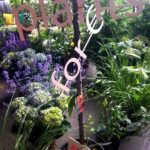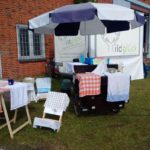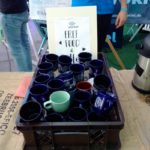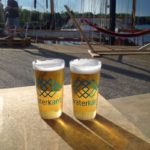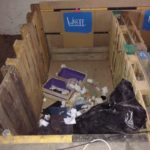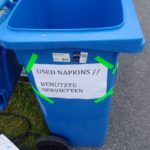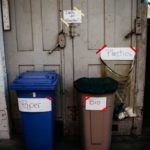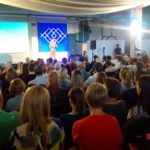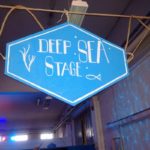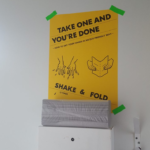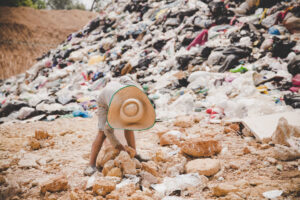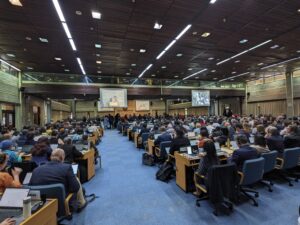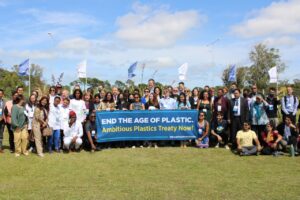Waterkant 2019: a festival truly Zero Waste
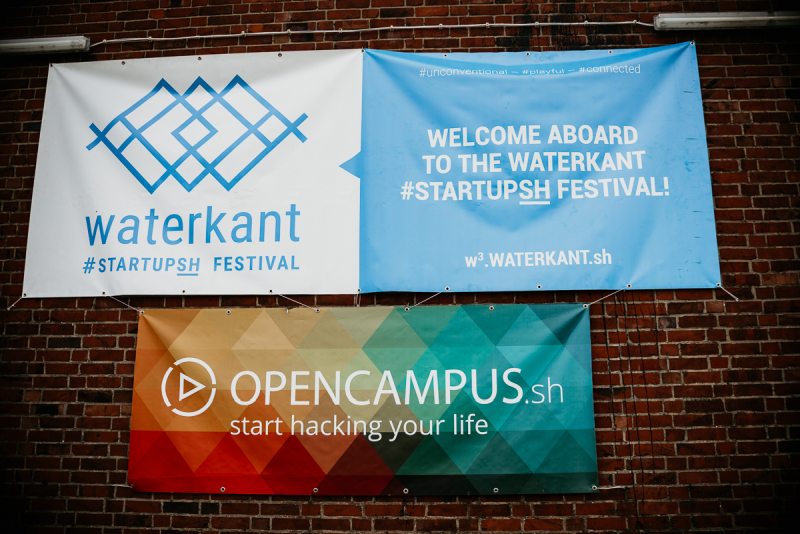
For the 4th consecutive year, the Waterkant festival took place in Kiel, Germany, on the 13th and 14th of June 2019.
It is a cross-border start-up festival (mostly Schleswig-Holstein and the Baltic area) with interactive workshops, inspiring speakers, innovative and engaging ideas and informal exchange as well as about 1,000 visitors. Since 2015, the festival has been showing growing attention for sustainable topics such as climate change, mobility and waste reduction. This year, part of the organisation team – Sylvie Rham, Alexander Ohrt, Tim Logan, and Eliza Rottengatter from Opencampus – supported by Zero Waste Kiel created a systematic waste reduction concept for the festival.
With their motto “RE//THINK” they placed the festival at the top of the Zero Waste hierarchy!
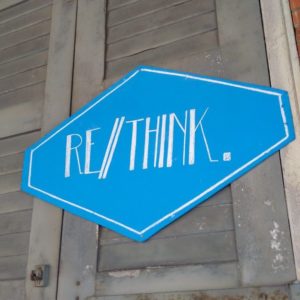
Waterkant 2019 benefits from one of Zero Waste Kiel‘s current projects that designs a modular “Zero Waste Certification” system for festivals, organisations, businesses and institutions. This project was submitted to the Cross Border Innovation Challenge of Kiel Region and will be further developed at European level with other members of the Zero Waste Europe network.
To go Zero Waste, you need certain ingredients: logistic skills, common sense, but also a strong will, passion and creativity. Those first two ingredients are the minimum qualities you would expect from good and experienced festival organisers. But, Zero Waste Kiel has experienced more will, passion, and creativity than it could have believed beforehand!
Together with Marie and Marc Delaperrière from Zero Waste Kiel we systematically analysed where the festival causes waste and what possible alternatives we had. That wasn’t easy at first, because you don’t question your habits at first glance. But once you start to think through the different areas, you notice more and more sources of waste and you come up with new ideas. We were like in a rush! And the best thing about it was: it was fun and playful and crazy creative!
Sylvie Rham, member of the Waterkant’s organisation team
Finally, even if some improvements can still be made, the festival truly deserved the title of a “Zero Waste Festival”.
Let’s have a closer look at some of the Zero Waste examples.
FESTIVAL INFRASTRUCTURES:
The festival itself was located in an old naval pilot squadron on the seaside of Kiel, temporarily giving new life to the place. Almost all decorations were made of re-used (and re-usable) materials and second-hand furniture. Signs were not painted, but they were written with chalk, ensuring the possibility to re-use them for the next festivals. Plants used for decoration were sold in an auction at the end of the festival.
FOOD AND DRINKS:
Water is a resource necessary for life and tap water is the most sustainable way to distribute it. In many festivals, people do not have access to it or need to beg for a glass of free water. In the old warehouse, water distribution points were very limited. Nevertheless, the team took care and refilled several big jars of water.
In the same area, fruits, vegetables, and chutney were offered for free by the group of food savers called Resteritter.
Food trucks and caterers were present as well: food and beverage were handed in reusable dishes. Disposables were entirely banned from the festival. Eating from a proper plate is not only a matter of Zero Waste: it also makes a meal more enjoyable. Doesn’t matter whether it is a vegan wrap or a classic “Currywurst”. Disposable straws were replaced by natural straws (or by no straws at all) and cloth napkins were used instead of paper ones.
“Spülbar”, an initiative providing a dishwasher mounted on a heavy duty bicycle, was taking care of the cleaning.
What you see and what you do not see
Zero Waste can be frustrating, especially when you wish your efforts to be visible. This is difficult when your Zero Waste alternatives mean that there might be nothing to see: some examples were the absence of marks in the parking areas or no name tags for participants (while in previous years they reused beer coasters as name tags).
WASTE MANAGEMENT:
Good on-site waste management is essential. Festival visitors could be lazy, so they need to quickly find the waste bins if you do not want to end up with a trashed place. Therefore, bins for sorting waste were placed in several spots. In the same way, close to each waste station, a box was placed for collecting deposit bottles and reusable dishes. Some helpers contributed to keeping it well organised during the festival.
The local waste management company ABK, already supporting the waste collection actions organised by Zero Waste Kiel, reacted very positively to the demand of several bins to make separating the waste possible. As a challenge, they provided only one residual waste bin for the entire festival!
Shortly before the festival, the Zero Waste Kiel Team did a last check-in with the organisers and delivered last suggestions on how to make the waste management logistics efficient between stands, caterer and central bins.
ZERO WASTE COMMUNICATION:
A festival needs publicity to be visited. Usually, there would be flyers, signs and the like. One might also receive goodies to take home. Waterkant adopted a minimalist approach, with a limited number of flyers in postcard format placed in strategic places, information about sponsors and partners was reduced to one wall as well as online communication. Indeed, the festival’s reputation gained from previous years was enough to attract visitors.
Communicating Zero Waste
To make a festival truly Zero Waste: communication is key! Visitors, partners, suppliers (which could be chosen among sustainable regional companies), exhibitors and any other actors must be informed in order to join efforts and do not go the opposite way (e.g. delivering beverages in plastic bottles).
The Waterkant Festival’s team adopted a clear communication strategy, setting a code of conduct, sharing several blog articles explaining Zero Waste choices as well as reminders throughout the festival. During the opening talk, Tim Logan announced the Zero Waste approach. In addition, the sorting containers allowed visitors to actually see with their own eyes the waste produced during the festival and its management.
Zero Waste Kiel was also present with its highly visible stand. Skadi Frahm, Pia Stock and Frederike Fahrenbach provided information about the Zero Waste concept and how the association promotes it in lifestyle, businesses and cities. The results of such communication strategy were outstanding: Zero Waste was universally respected by visitors, exhibitors and partners – and very little waste was produced!Room for improvement? Accepting imperfection and wrapping-up
Since the 2019 edition was a trial, the coming years will be even more challenging. Obviously, not everything was perfect (e.g. some caterers proposed paper tissues or carton plates, there were not enough signs causing confusion on the different waste bins). The Zero Waste approach and an honest intention to follow it up were essential. However, in the next years it will be important to improve logistics and communication. Zero Waste Kiel will meet up again with the festival’s core team to debrief about the event, highlighting the future potentials and to have a quantified wrap-up of the waste outcome.
Reproduce and scale the model
Festivals, exhibitions or any other event are frequently used to promote new products, brands or technologies as they impact a large and receptive public. But, as shown by Waterkant, they can also demonstrate to the same large public that new ecological visions such as Zero Waste are a reality (Waterkant also addressed topics like mobility – inspiring visitors to come by bike -, food and energy).
What was done at Waterkant, can be replicated, no matter the scale. For Zero Waste Kiel it was also an interesting pilot experience, and they aim at supporting other Zero Waste initiatives to further improve their coaching tools.
Does this post tickle your imagination? Do any Zero Waste ideas for your own projects pop up in your head? Don’t forget… the key word is “RE//THINK”!For more information, please visit:
Photo credits: Pia stock, Marie Delaperrière, Marc Delaperrière
Special thanks to the opencampus.sh team


